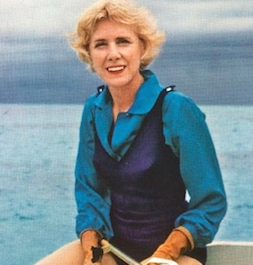The feminist heroine whose brilliant mind brought her into the Church
- CHARLES A. COULOMBE
Life was fun and exciting for her—until a tragedy that prompted deep soul-searching.
 Clare Boothe Luce
Clare Boothe Luce1903-1987
Imagine, if you will, a gathering of bright young girls at Boston's Emmanuel College, a prestigious Catholic women's college run by the Sisters of Notre Dame de Namur. It is 1947, and they are about to hear a lecture by a glamorous new convert to the Catholic Church: playwright, politician, journalist, socialite and wit Clare Boothe Luce—wife of Time Life owner-publisher Henry Luce. Mrs Luce had been brought into the Church the year before by a man who was himself a rising star in the Catholic world, Mgr Fulton Sheen, and her arrival was keenly awaited by the ladies of Emmanuel.
Once on stage, she won them over easily with her poise, charm and sophistication, as she told the story of her coming into the faith. When she had finished, questions began. Now, even at this seemingly innocent time, 21 years before Humanae Vitae, "advanced" Catholics were already questioning the Church's ban on birth control. "Surely," thought one of these in the student body, "an urbane lady like Clare Boothe Luce would think the ban ridiculous"—and so asked the eminent visitor her views on the matter. "Well," came the steady-eyed reply, "I practised birth control for 30 years, and all I have to show for it is one dead daughter." The proverbial silence was proverbially deafening.
But this performance was typical of Clare Boothe Luce, a woman born in poverty who rose to command great wealth, who wrote a wildly popular and unsparingly "feminist" play and became a vocal champion of traditional women's roles; and whose intelligence—while leading her to rival Dorothy Parker as a coiner of witticisms—brought her eventually to the Catholic Church.
Born in 1903 to unmarried parents who would separate when she was nine years old, she nevertheless inherited a love of literature from her father, a violin-playing travelling salesman, and charm and ambition from her mother. Her peripatetic childhood saw her with one parent or another in Memphis and Nashville, Tennessee, Chicago, Illinois, Union City, New Jersey, and New York City, Garden City, and Tarrytown, New York. In the latter place she graduated—thanks to a wealthy stepfather—from a private girls' school, The Castle, in 1919, in first place despite her young age.
The beautiful and brilliant Clare worked as an actress and for women's suffrage until marrying clothing magnate George Tuttle Brokaw in 1923. Although blessed with the aforementioned daughter, Ann, the following year, the Brokaws broke up in 1929.
Her trademark sardonic humour served her well in these positions (she was, for example, the originator of the old saw "No good deed goes unpunished").
But Clare moved on to other things. In 1931 she published a volume of short stories that critics compared favourably with Waugh's work. She then became successively a caption writer at Vogue and associate and managing editor of Vanity Fair. Her trademark sardonic humour served her well in these positions (she was, for example, the originator of the old saw "No good deed goes unpunished").
In 1935 she married magazine magnate Henry Luce, started writing for his publications, Time and Life, and the following year wrote a hit play, The Women—made into a film in 1939. As World War II heated up, she visited the battlefields both with and without Henry. Were that not enough to keep a woman busy, in 1942 she was elected as a Republican to the House of Representatives from Connecticut. Life was fun and exciting for her—until her daughter was killed in a car accident on the way to Stanford in 1944.
There followed two years of soul-searching and psychotherapy, which was only concluded with her reception into the Catholic Church. In 1951, she built St Ann's Chapel in her daughter's memory for the Catholic community at Stanford (closed by the diocese in 1998, it was bought by the Henry Luce Foundation, which then sold it to the Continuing Anglican group that still has it).
The following year, 1952, she edited Saints For Now, a collection of modern hagiographies. Her continuing work for the faith saw her become a Dame of Malta. After her campaigning for Eisenhower, the new president appointed her ambassador to Italy, where she became a friend of Pius XII.
The passing years did not dull either her enthusiasm or her activity. Retiring from her diplomatic career in 1959, she campaigned vigorously for Goldwater, Nixon and Reagan, served on various boards, and received a decoration from West Point. She died in 1987, and several charities are named after her.
If any anti-Catholic is foolish enough to tell you that the Church "does not empower women" or some such drivel, you need not reach as far back as Catherine of Alexandria or Joan of Arc (to say nothing of the Queen of Heaven)—just point out the irrepressible Clare Boothe Luce.
 This is Meaghen Gonzalez, Editor of CERC. I hope you appreciated this piece. We curate these articles especially for believers like you.
This is Meaghen Gonzalez, Editor of CERC. I hope you appreciated this piece. We curate these articles especially for believers like you.
Please show your appreciation by making a $3 donation. CERC is entirely reader supported.

Acknowledgement

Charles A. Coulombe. "The feminist heroine whose brilliant mind brought her into the Church." Catholic Herald (March 28, 2019).
Reprinted with permission of the Catholic Herald. The Catholic Herald is a London-based magazine, established as a newspaper in 1888 and published in the United Kingdom and the Republic of Ireland.
The Author
Charles A. Coulombe is an author and lecturer based in Los Angeles and Vienna.
Copyright © 2019 Catholic Herald



